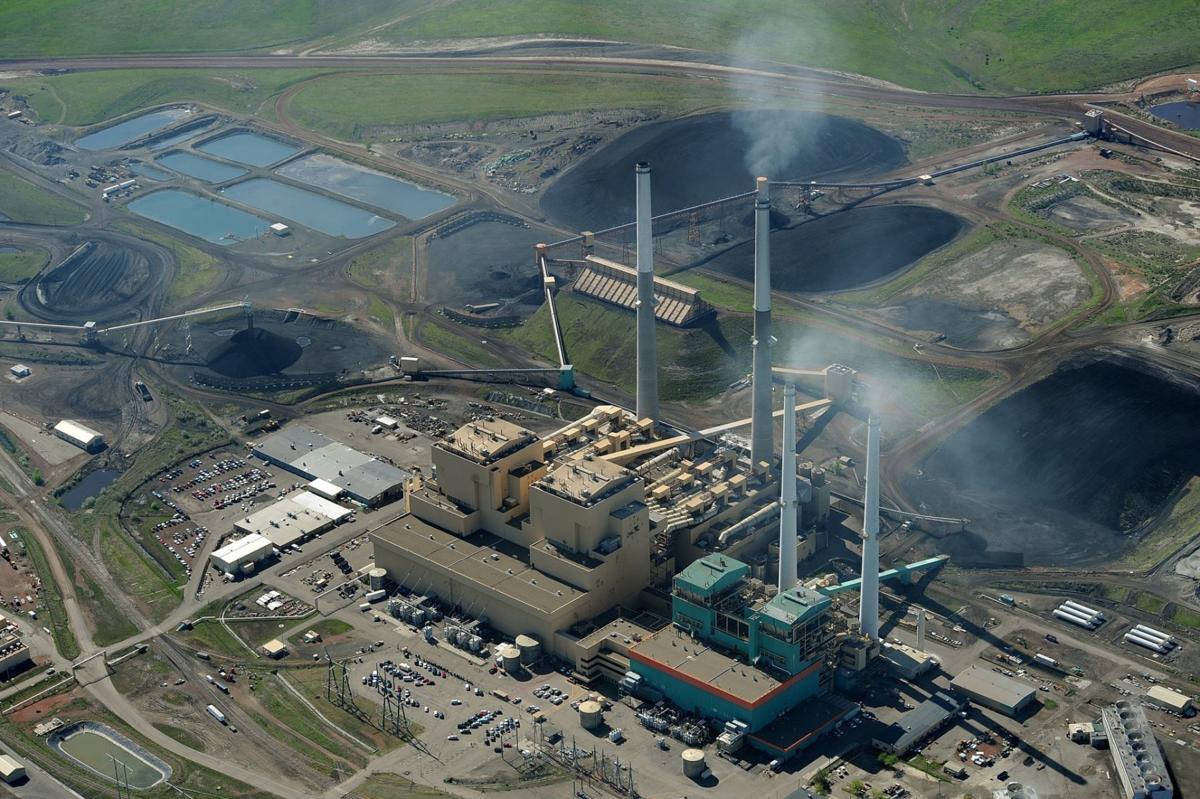Source: http://billingsgazette.com, August 15, 2017
By: Tom Lutey

An aerial view shows Colstrip power plants 1, 2, 3 and 4 and the Westmoreland coal mines near Colstrip.
Talen Energy has put a $138 million price tag on capping Colstrip Power Plant’s toxic coal ash ponds.
The co-owner and operator of the southeast Montana coal-fired power plant submitted the required estimates earlier this month to the state’s Department of Environmental Quality. Capping the ash ponds is only one portion of a three-stage cleanup plan, and likely the cheapest of the three.
It’s estimated that every year 200 million gallons of contaminated water seeps from the ash ponds into the groundwater, rendering the groundwater undrinkable for the Colstrip community of about 2,300.
The contamination has been occurring for 30 years. The polluted ponds’ worst ingredient is “bottom ash,” a highly concentrated coal ash sludge that contains lead, arsenic, boron and other toxic chemicals that can cause liver, kidney, brain and testicle damage.
The cost estimate filed at the beginning of August was a DEQ requirement of an administrative order of consent, or AOC, from August 2012. Talen had five years to submit a cost estimate for the “closure” phase of the cleanup. Estimates for the other two stages do not have hard deadlines and haven’t been submitted.
“In its role as operator of the Colstrip Station, we submitted the closure plan, on time and on behalf of the entire ownership group, on Aug. 1, 2017,” Talen Spokesman Todd Martin said in an email.
Talen’s co-owners are Washington state utilities Puget Sound Energy and Avista Corp.; Oregon utilities PacifiCorp and Portland General Electric; and NorthWestern Energy, which serves half of Montana’s population.
DEQ officials say they haven’t had time yet to review Talen’s report in detail. A 60-day public comment period on the report began Monday. DEQ made the three-part report available online late last week.
One point of concern about Talen’s plan is that the contaminating coal ash will not be removed, said Jenny Harbine, attorney for EarthJustice. Rather, the ponds will be dewatered, then capped with a liner, clay and soil.
So long as the ash remains, there will be a risk of continued contamination, Harbine said. The cap liner is supposed to stop future pollution by keeping water away from the ash, but Colstrip has a history with liners that eventually leak.
“The safety of their closure plan really hinges entirely on the integrity of these liners and caps and we simply don’t have enough information to know if they’ll work,” Harbine said.
In 2008, the power plant owners were sued by 57 Colstrip residents over the decades of groundwater contamination from the power plants’ numerous ash ponds, which cover roughly 800 acres. Because of the contamination, the Colstrip community gets its water from the Yellowstone River 30 miles away. The power plant draws the water to service its steam generators. The City of Colstrip’s water needs are met by the power plant’s water delivery.
The Colstrip plaintiffs settled with the power plant owners, but the pollution persisted as the ash ponds continued to leak. In 2012, Harbine represented the Montana Environmental Information Center, The Sierra Club and the National Wildlife Federation in a lawsuit that accused DEQ and the power plants’ owners of doing little to stop the ash pond contamination.
The 2012 lawsuit resulted in a 2016 settlement, in which the power plant’s owners agreed to stop pooling toxic coal ash and sludge beginning in 2019. The power plant owners must come up with a way to dry the bottom ash for storage by the end of 2018. The same method will be used by the middle of 2022 to treat sludge collected from the power plant’s air pollution scrubbers.
Currently that ash and sludge are piped wet into pools. Turning off the tap to that process is key to dewatering the ash ponds for cleanup. Talen indicates the water from the ponds will be cleaned and used in the power plant.
The Colstrip power plant is at a turning point, with the beginning of the ash pond cleanup and the closure of two of the power plant’s four units sometime in the next six years. Talen and Puget Sound Energy, which co-own Colstrip Units 1 and 2 agreed last year to shutter the units by 2022 in order to settle an air pollution lawsuit filed by the Sierra Club and MEIC.
Colstrip Units 3 and 4 are not expected to shut down as ash pond cleanup begins. However those units, built in the 1980s, do face challenges. In public documents filed in Washington state, Puget Sound Energy experts estimate that Units 3 and 4 will shut down in 2035.
Portland General Electric is obligated under Oregon law to cut coal power from its portfolio by 2035, as well. PacifiCorp is expected to stop supplying coal power to its Oregon customers by 2030, though PacifiCorp has customers in other states where governments aren’t shutting the regulatory door to coal power. In Oregon, concern about coal power plant carbon dioxide emissions, which contribute to climate change, has led to a coal-power ban.
Avista Corp. told The Gazette last week that it expects to draw power from Colstrip Units 3 and 4 until 2037.
DEQ is currently reviewing the Talen plants to remedy the ash pond contamination. The criteria for cleanup is also under review, and DEQ expects to finish the process by month’s end. However, Talen will respond to DEQ’s critique. The process will take months, if not longer, to complete.
Work on the actual decommissioning of Colstrip Power Plant Units 1 and 2, hasn’t started. Only the ash pond cleanup is being discussed.







